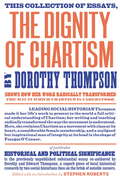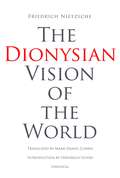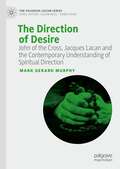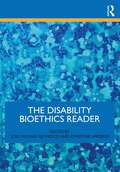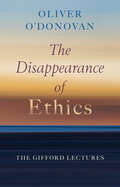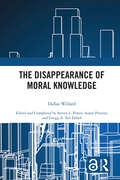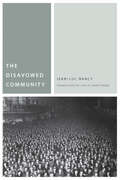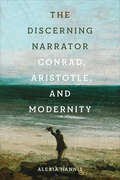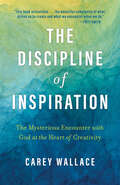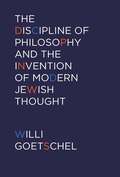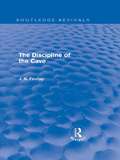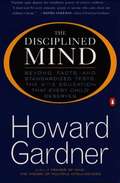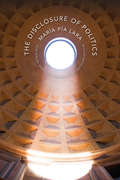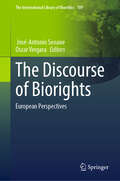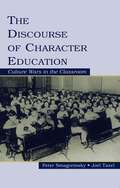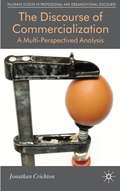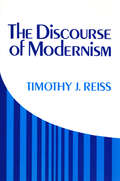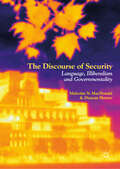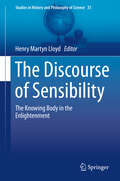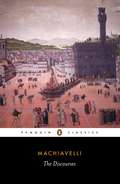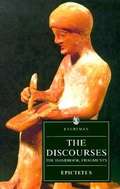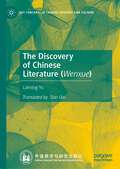- Table View
- List View
The Dignity of Chartism
by Dorothy Thompson Stephen Roberts E. P ThompsonThis is the first collection of essays on Chartism by leading social historian Dorothy Thompson, whose work radically transformed the way in which Chartism is understood. Reclaiming Chartism as a fully-blown working-class movement, Thompson intertwines her penetrating analyses of class with ground-breaking research uncovering the role played by women in the movement.Throughout her essays, Thompson strikes a delicate balance between down-to-the-ground accounts of local uprisings, snappy portraits of high-profile Chartist figures as well as rank-and-file men and women, and more theoretical, polemical interventions.Of particular historical and political significance is the previously unpublished substantial essay co-authored by Dorothy and Edward Thompson, a superb piece of local historical research by two social historians then on the brink of notable careers.From the Trade Paperback edition.
The Dimensions of Consequentialism
by Martin PetersonConsequentialism, one of the major theories of normative ethics, maintains that the moral rightness of an act is determined solely by the act's consequences. The traditional form of consequentialism is one-dimensional, in that the rightness of an act is a function of a single moral aspect, such as the sum total of wellbeing it produces. In this book Martin Peterson introduces a new type of consequentialist theory: multidimensional consequentialism. According to this theory, an act's moral rightness depends on several separate dimensions, including individual wellbeing, equality and risk. Peterson's novel approach shows that moral views about equality and risk that were previously thought to be mutually incompatible can be rendered compatible, and his precise theoretical discussion helps the reader to understand better the distinction between consequentialist and non-consequentialist theories. His book will interest a wide range of readers in ethics.
The Dionysian Vision of the World (Univocal)
by Friedrich NietzscheBefore the world knew of the thinker who &“philosophizes with a hammer,&” there was a young, passionate thinker who was captivated by the two forces found within Greek art: Dionysus and Apollo. In this essay, which was the forerunner to his groundbreaking book The Birth of Tragedy, The Dionysian Vision of the World provides an unparalleled look into the philosophical mind of one of Europe&’s greatest and provocative intellects at the beginning of his philosophical interrogation on the subject of art. &“While dreaming is the game man plays with reality as an individual, the visual artist (in the larger sense) plays a game with dreaming.&” This is the Dionysian vision of the world.
The Direction of Desire: John of the Cross, Jacques Lacan and the Contemporary Understanding of Spiritual Direction (The Palgrave Lacan Series)
by Mark Gerard MurphyThis book examines Lacanian psychoanalysis and Christian mystical theology demonstrating the former’s potential for reinvigorating spiritual direction. The author outlines how current methods of spiritual direction become saturated with self-help psycho-pop methodologies, and that desire has therefore been foreclosed in these practices. He suggests that the root of this is a focus on ‘positive affective experientialism’, which means spiritual direction must focus on emotional wholeness, healing and positivity. Finally, he argues that a new dialogue between John of the Cross (a mystic whose writings on spiritual direction formulate part of the core of the Catholic spiritual tradition) and Jacques Lacan can open the way for a spiritual direction beyond the confines of experientialism. The book concludes that we can only escape the experiential commodification of spiritual direction by critiquing the drive to experience in and of itself. This novel work will appeal in particular to students and scholars of psychoanalysis, religion, philosophy and critical theory.
The Disability Bioethics Reader
by Joel Michael Reynolds Christine WieselerThe Disability Bioethics Reader is the first introduction to the field of bioethics presented through the lens of critical disability studies and the philosophy of disability. Introductory and advanced textbooks in bioethics focus almost entirely on issues that disproportionately affect disabled people and that centrally deal with becoming or being disabled. However, such textbooks typically omit critical philosophical reflection on disability. Directly addressing this omission, this volume includes 36 chapters, most appearing here for the first time, that cover key areas pertaining to disability bioethics, such as: state-of-the-field analyses of modern medicine, bioethics, and disability theory health, disease, and the philosophy of medicine issues at the edge- and end-of-life, including physician-aid-in-dying, brain death, and minimally conscious states enhancement and biomedical technology invisible disabilities, chronic pain, and chronic illness implicit bias and epistemic injustice in health care disability, quality of life, and well-being race, disability, and healthcare justice connections between disability theory and aging, trans, and fat studies prenatal testing, abortion, and reproductive justice. The Disability Bioethics Reader, unlike traditional bioethics textbooks, also engages with decades of empirical and theoretical scholarship in disability studies—scholarship that spans the social sciences and humanities—and gives serious consideration to the history of disability activism.
The Disappearance of Ethics: The Gifford Lectures
by Oliver O'DonovanThe capstone lectures of esteemed ethicist Oliver O&’Donovan What is the future of ethics? Oliver O&’Donovan addresses a discipline in crisis in The Disappearance of Ethics. Based on the 2021 Gifford Lectures, this book contends that contemporary ethics has lost its object (good), frontier (time), and agent (person). O&’Donovan traces the development of these concepts from Greek philosophy through early Christianity, the Enlightenment, and into the modern era. Engaging with a range of thinkers including Aristotle, Augustine of Hippo, Max Scheler, Karl Barth, and more, O&’Donovan shows how ethics has lost its heart and how the field can regain its purpose. He completes his lectures by integrating theology and philosophy to recover ethics. Contemplating theological concepts such as creation, divine law, and justification undergirds ethics by generating &“existential wonder.&” With characteristic warmth and scholarly precision, O&’Donovan reinvigorates ethical argument with theological insight. Scholars and students of Christian ethics will find his lectures equally provocative and inspiring.
The Disappearance of Moral Knowledge
by Dallas WillardBased on an unfinished manuscript by the late philosopher Dallas Willard, this book makes the case that the 20th century saw a massive shift in Western beliefs and attitudes concerning the possibility of moral knowledge, such that knowledge of the moral life and of its conduct is no longer routinely available from the social institutions long thought to be responsible for it. In this sense, moral knowledge—as a publicly available resource for living—has disappeared. Via a detailed survey of main developments in ethical theory from the late 19th through the late 20th centuries, Willard explains philosophy’s role in this shift. In pointing out the shortcomings of these developments, he shows that the shift was not the result of rational argument or discovery, but largely of arational social forces—in other words, there was no good reason for moral knowledge to have disappeared.The Disappearance of Moral Knowledge is a unique contribution to the literature on the history of ethics and social morality. Its review of historical work on moral knowledge covers a wide range of thinkers including T.H Green, G.E Moore, Charles L. Stevenson, John Rawls, and Alasdair MacIntyre. But, most importantly, it concludes with a novel proposal for how we might reclaim moral knowledge that is inspired by the phenomenological approach of Knud Logstrup and Emmanuel Levinas. Edited and eventually completed by three of Willard’s former graduate students, this book marks the culmination of Willard’s project to find a secure basis in knowledge for the moral life.
The Disavowed Community (Commonalities)
by Jean-Luc NancyOver thirty years after Maurice Blanchot writes The Unavowable Community (1983)—a book that offered a critical response to an early essay by Jean-Luc Nancy on “the inoperative community”—Nancy responds in turn with The Disavowed Community. Stemming from Jean-Christophe Bailly’s initial proposal to think community in terms of “number” or the “numerous,” and unfolding as a close reading of Blanchot’s text, Nancy’s new book addresses a range of themes and motifs that mark both his proximity to and distance from Blanchot’s thinking, from Bataille’s “community of lovers” to the relation between community, communitarianism, and being-in-common; to Marguerite Duras, to the Eucharist. A key rethinking of politics and the political, this exchange opens up a new understanding of community played out as a question of avowal.
The Discerning Narrator: Conrad, Aristotle, and Modernity
by Alexia HannisThe Discerning Narrator sheds new light on Joseph Conrad’s controversial critique of modernity and modernization by reading his work through an Aristotelian lens. The book proposes that we need Aristotle – a key figure in Conrad’s education – to recognize the profound significance of Conrad’s artistic vision. Offering Aristotelian analyses of Conrad’s letters, essays, and four works of fiction, Alexia Hannis illuminates the philosophical roots and literary implications of Conrad’s critique of modernity. Hannis turns to Aristotle’s ethical formulations to trace what she calls "the discerning narrator" in Conrad’s oeuvre: a compassionate yet sceptical guide to appraising character and conduct. The book engages with past and current Conrad scholarship while drawing from Aristotle’s Poetics, Politics, and Nicomachean Ethics to offer original philosophical analyses of Conrad’s works. Drawing on Aristotle, Hannis provides a fresh context for making sense of Conrad’s self-differentiation from modernity. As a result, The Discerning Narrator provides an affirmation of literature’s invitation to wonder about the possibilities inherent in human nature, including the potential for painful depravity, heroic excellence, and ordinary human happiness.
The Discipline of Inspiration: The Mysterious Encounter with God at the Heart of Creativity
by Carey WallaceLearn where inspiration comes from and how to harness it in your life and work. We all know the sensation of inspiration. It&’s what tells a painter what to paint and a singer how to sing—and what prompts us to throw a new spice into an old recipe. But what is inspiration? When we train artists, we typically identify them by their talent and train them in technique. We talk very little about the crucial creative spark of inspiration. Where does it come from? What does it want from us? How can we get more of it? In The Discipline of Inspiration, Carey Wallace meditates on this vital spark and on the ways artists have negotiated with it across genres and throughout history. She also offers practical methods—including silence, community, and rest—to help everyone access more inspiration, more often. Artists will develop a fresh perspective on inspiration and learn new tools for their creative practice. And readers from all walks of life will discover the transformative power of inspiration in every aspect of their lives.
The Discipline of Philosophy and the Invention of Modern Jewish Thought
by Willi GoetschelExploring the subject of Jewish philosophy as a controversial construction site of the project of modernity, this book examines the implications of the different and often conflicting notions that drive the debate on the question of what Jewish philosophy is or could be.The idea of Jewish philosophy begs the question of philosophy as such. But “Jewish philosophy” does not just reflect what “philosophy” lacks. Rather, it challenges the project of philosophy itself.Examining the thought of Spinoza, Moses Mendelssohn, Heinrich Heine, Hermann Cohen Franz Rosenzweig, Martin Buber, Margarete Susman, Hermann Levin Goldschmidt, and others, the book highlights how the most philosophic moments of their works are those in which specific concerns of their “Jewish questions” inform the rethinking of philosophy’s disciplinarity in principal terms.The long overdue recognition of the modernity that informs the critical trajectories of Jewish philosophers from Spinoza and Mendelssohn to the present emancipates not just “Jewish philosophy” from an infelicitous pigeonhole these philosophers so pointedly sought to reject but, more important, emancipates philosophy from its false claims to universalism.
The Discipline of the Cave (Routledge Revivals)
by John Niemeyer FindlayFirst published in 1966, The Discipline of the Cave is the first series of a course of Gifford lectures on philosophical issues.. J N Findlay’s lectures use the image of the Cave to show how familiarity is full of restrictions, and involves puzzles and discrepancies unable to be resolved or removed. Such philosophical perplexities may be a result of the misunderstanding and abuse of ordinary ways of thinking and speaking. They may also be a way of ‘drawing us towards being’, providing proof of the absurdity of ordinary thought, speech and experience unless modified and added to in ways which may point beyond it. What may be called a mystical and otherworldly element may need to be introduced into or rendered explicit in all our experience in order to give a viable sense to the most commonplace human utterances and activities.
The Disciplined Mind: Beyond Facts Standardized Tests K 12 Educ That Every Child Deserves
by Howard Gardner<P>Howard Gardner's concept of multiple intelligences has been hailed as perhaps the most profound insight into education since the work of Jerome Bruner, Jean Piaget, and, even earlier, John Dewey.<P> Now in The Disciplined Mind, Gardner pulls together the threads of his previous works in a major new synthesis aimed at parents, educators, and the general public alike.<P> The Disciplined Mind looks beyond such parochial issues as charters, vouchers, unions, and affirmative action in order to explore the larger questions of what an educated person should be and how such an education can be achieved for all students.<P> Gardner eloquently argues that the purpose of K-12 education should be to enhance students' deep understanding of truth (and falsity), beauty (and ugliness), and goodness (and evil) as defined by their various cultures. With this stance, Gardner transforms the tired debate between "traditionalists" and "progressives.".
The Disclosure of Politics
by Maria Pia LaraMaría Pía Lara explores the ambiguity of secularization and the theoretical potential of a structural break between politics and religion. For Lara, secularization means the translation of religious semantics into politics; a transformation of religious notions into political ideas; and the reoccupation of a space left void by changing political actors, one that gives rise to new conceptions of political interaction. Conceptual innovation redefines politics as a horizontal relationship between governments and the governed, better enabling societies (and political actors) to articulate meaning through action.
The Disclosure of Politics: Struggles Over the Semantics of Secularization (New Directions in Critical Theory #35)
by Maria LaraPostmodern political critiques speak of the death of ideology, the end of history, and the postsecular return of religious attitudes, yet radical conservative theorists such as Mark Lilla argue religion and politics are inextricably intertwined. Returning much-needed uncertainty to debates over the political while revitalizing the very terms in which they are defined, María Pía Lara explores the ambiguity of secularization and the theoretical potential of a structural break between politics and religion.For Lara, secularization means three things: the translation of religious semantics into politics; a transformation of religious notions into political ideas; and the reoccupation of a space left void by changing political actors that gives rise to new conceptions of political interaction. Conceptual innovation redefines politics as a horizontal relationship between governments and the governed and better enables societies (and individual political actors) to articulate meaning through action—that is, through the emergence of new concepts. These actions, Lara proves, radically transform our understanding of politics and the role of political agents and are further enhanced by challenging the structural dependence of politics on religious phenomena.
The Discourse of Biorights: European Perspectives (The International Library of Bioethics #109)
by José-Antonio Seoane Oscar VergaraThis book provides answers to the questions that biomedical and biotechnological research has posed to our societies by proposing the introduction of biorights. It shows how bioscience affects our individual and social lives by discussing and answering important questions such as; Are we becoming more vulnerable and unable to protect ourselves? How can we ensure fairness and justice with regards to the access to health care? Are human dignity, autonomy and equality at risk? Do we need new and special rights: neurorights, genetic rights? What is the meaning and scope of the right to life, health, privacy or non-discrimination? Biorights are the suggested solution for dealing with these challenges. Healthcare professionals, bio-researchers, policy makers, scholars, and citizens will, in this book, find a guide to knowing how bioscience affects our lives. Furthermore, this book provides a comprehensive method for biomedical and biotechnological decision-making that comprises human or basic rights dimensions alongside technical and ethical dimensions. Chapters 1, 12 and 18 are available open access under a Creative Commons Attribution 4.0 International License via link.springer.com.
The Discourse of Character Education: Culture Wars in the Classroom
by Peter Smagorinsky Joel TaxelIn this book Peter Smagorinsky and Joel Taxel analyze the ways in which the perennial issue of character education has been articulated in the United States, both historically and in the current character education movement that began in earnest in the 1990s. The goal is to uncover the ideological nature of different conceptions of character education. The authors show how the current discourses are a continuation of discourse streams through which character education and the national purpose have been debated for hundreds of years, most recently in what are known as the Culture Wars--the intense, often passionate debates about morality, culture, and values carried out by politicians, religious groups, social policy foundations, and a wide range of political commentators and citizens, in which the various stakeholders have sought influence over a wide range of social and economic issues, including education. The centerpiece is a discourse analysis of proposals funded by the United States Department of Education's Office of Educational Research and Improvement (OERI). Discourse profiles from sets of states that exhibit two distinct conceptions of character are examined and the documents from particular states are placed in dialogue with the OERI Request for Proposals. One profile reflects the dominant perspective promoted in the U.S., based on an authoritarian view in which young people are indoctrinated into the value system of presumably virtuous adults through didactic instruction. The other reflects the well-established yet currently marginal discourse emphasizing attention to the whole environment in which character is developed and enacted and in which reflection on morality, rather than didactic instruction in morality, is the primary instructional approach. By focusing on these two distinct regions and their conceptions of character, the authors situate the character education movement at the turn of the twenty-first century in the context of historical notions about the nature of character and regional conceptions regarding the nature of societal organization. This enlightening volume is relevant to scholars, practitioners, policymakers, and students across the field of education, particularly those involved in character education, moral development, discourse analysis, history and cultural foundations of education, and related fields, and to the wider public interested in character education.
The Discourse of Commercialization
by Jonathan CrichtonAn examination of how the commercialization of professional practice is implicated in its organizational discourses. Drawing on a study of ELT colleges, the book explores how teaching practices are permeated and challenged by a 'discourse of commercialization' through which market priorities become normative in teachers' professional lives.
The Discourse of Modernism
by Timothy J. ReissTimothy J. Reiss perceives a new mode of discourse emerging in early seventeenth-century Europe; he believes that this form of thought, still our own, may itself soon be giving way. In The Discourse of Modernism, Reiss sets up a theoretical model to describe the process by which one dominant class of discourse is replaced by another. He seeks to demonstrate that each new mode does not constitute a radical break from the past but in fact develops directly from its predecessor.
The Discourse of Security: Language, Illiberalism And Governmentality (Postdisciplinary Studies in Discourse)
by Malcolm N. MacDonald Duncan HunterThis book explores how language constructs the meaning and praxis of security in the 21st century. Combining the latest critical theories in poststructuralist and political philosophy with discourse analysis techniques, it uses corpus tools to investigate four collections of documents harvested from national and international security organisations. This interdisciplinary approach provides insights into the ways in which discourse has been mobilised to construct a strategic response to major terrorist attacks and geo-political events. The authors identify the way in which it is used to realize tactics of governmentality and form security as a discipline. This at once constructs a state of exception while also adhering to the principles of liberalism. This insightful study will be of particular interest to students and scholars of subjects such as applied linguistics, political science, security studies and international relations, with additional relevance to other areas including law, criminology, sociology and economics.
The Discourse of Sensibility
by Henry Martyn LloydThis volume reconstructs the body of sensibility and the discourse which constructed it. The discourse of sensibility was deployed very widely throughout the mid- to late-eighteenth century, particularly in France and Britain. To inquire into the body of sensibility is then necessarily to enter into an interdisciplinary space and so to invite the plurality of methodological approaches which this collection exemplifies. The chapters collected here draw together the histories of literature and aesthetics, metaphysics and epistemology, moral theory, medicine, and cultural history. Together, they contribute to four major themes: First, the collection reconstructs various modes by which the sympathetic subject was construed or scripted, including through the theatre, poetry, literature, and medical and philosophical treaties. It secondly draws out those techniques of affective pedagogy which were implied by the medicalisation of the knowing body, and thirdly highlights the manner in which the body of sensibility was constructed as simultaneously particular and universal. Finally, it illustrates the 'centrifugal forces' at play within the discourse, and the anxiety which often accompanied them. At the centre of eighteenth-century thought was a very particular object: the body of sensibility, the Enlightenment's knowing body. The persona of the knowledge-seeker was constructed by drawing together mind and matter, thought and feeling. And so where the Enlightenment thinker is generally associated with reason, truth-telling, and social and political reform, the Enlightenment is also known for its valorisation of emotion. During the period, intellectual pursuits were envisioned as having a distinctly embodied and emotional aspect. The body of 'sensibility' encompassed these apparently disparate strands and was associated with terms including 'sentimental', 'sentiment', 'sense', 'sensation', and 'sympathy'.
The Discourses
by Niccolo MachiavelliFew figures in intellectual history have proved as notorious and ambiguous as Niccolò Machiavelli. But while his treatise The Prince made his name synonymous with autocratic ruthlessness and cynical manipulation, The Discourses (c.1517) shows a radically different outlook on the world of politics. In this carefully argued commentary on Livy’s history of republican Rome, Machiavelli proposed a system of government that would uphold civic freedom and security by instilling the virtues of active citizenship, and that would also encourage citizens to put the needs of the state above selfish, personal interests. Ambitious in scope, but also clear-eyed and pragmatic, The Discourses creates a modern theory of republic politics.Leslie J. Walker’s definitive translation has been revised by Brian Richardson and is accompanied by an introduction by Bernard Crick, which illuminates Machiavelli’s historical context and his new theories of politics. This edition also includes suggestions for further reading and notes.
The Discourses of Epictetus
by Epictetus Robin Hard Christoper GillThe Everyman Paperback Classics series offers the latest scholarship on the works of the world's greatest poets, writers and philosophers. Each edition includes a comprehensive introduction, chronology, notes, appendix, critical responses, and a text summary.
The Discovery of Chance: The Life and Thought of Alexander Herzen
by Aileen M. KellyThe intellectual Alexander Herzen was as famous in his day as Tolstoy and Dostoevsky. Aileen Kelly presents the first fully rounded study of the farsighted genius whom Isaiah Berlin called the forerunner of much twentieth-century thought. For Herzen, history, like Darwinian nature, was an improvisation both constrained and encouraged by chance.
The Discovery of Chinese Literature (Key Concepts in Chinese Thought and Culture)
by Laiming YuThis book traces the origin and evolvement of two Chinese characters “wenxue”(literature) by using the methods of conceptual history and historical and cultural semantics, and by taking the evolution and changes of the concept of the these two characters and their interpretations in the west as a window, and re-examining the contemporary morphology of concept evolution in the historical context of concept generation and development to discover the historical and cultural connotations hidden behind the characters, so as to embark on a vivid journey to explore the history of literary thought, discipline and culture. The entire book is woven with the concept of “literature” at its core. Following the author's analysis and interpretation, an interlocking and orderly network of description of ancient and modern, Chinese and foreign unfolds. In this context, the chapters are progressive and mutually responsive, forming an organic whole which is connected at the beginning and the end. For those readers who are trying to understand how Chinese “wenxue” evolved from one of the “four disciplines of Confucius” into a modern discipline and concept, this book will provide the most detailed, in-depth, and vivid historical picture.
